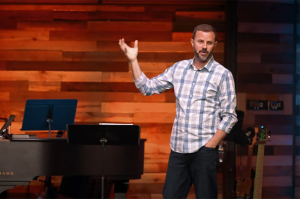Skillet's John Cooper identifies 2 signs Marxism, secular humanism is creeping into churches

NASHVILLE, Tenn. — John Cooper, lead singer of the Grammy-nominated rock group Skillet, addressed what he sees as a troubling silence in the Church on critical issues such as Marxism and the evolving language of social justice movements and identified signs churches are capitulating to secular humanism.
In an interview with The Christian Post at the GMA Dove Awards, Cooper, who also hosts the "Cooper Stuff" podcast and is known for his outspokenness on faith and culture, said he’s concerned by some of the dangerous ideologies he's seen creep into the Church in recent years.
“I’m seeing a lot of Marxism and its offshoots,” the 49-year-old singer said, citing Critical Race Theory and “ideologies break us into groups — white Christians, black Christians, women Christians, men Christians.”
“That’s a form of Marxism, and it’s not good,” he said.
Cooper said this ideological division is a symptom of a larger cultural shift toward secularism, where morality is defined without reference to the Bible or God.
"There's this idea that we can create a good and just world without the Bible, without God. That's basically what secular humanism is," Cooper explained. He noted that many churches, perhaps with good intentions, are trying to align themselves with secular ideas in an effort to show empathy or relevance — but these efforts can lead to adopting values antithetical to biblical teachings.
“These secular humanist ideas always lead to really bad outcomes,” he said.
One of the examples he cited is the growing normalization of homelessness and drug use in cities.
“There’s this notion that we’re caring for the homeless by creating places where they can shoot up drugs safely. It's not good for them — it’s terrible,” he said, adding that it’s symptomatic of a broader “culture of death,” where states in the U.S. and Canada have moved toward legalizing euthanasia, even for teenagers suffering from depression.
He warned that this secular approach to solving societal issues is leading to dire consequences, with people paying taxes to fund programs that encourage addiction or end lives rather than offer redemption.
On the issue of biblical sexuality, Cooper acknowledged that more churches are beginning to wake up to the need for clear, biblical teachings on gender and sexuality — but many are still hesitant to take a strong stance, often under the guise of being “seeker-friendly” or avoiding controversy.
Signs of woke culture in the church
Cooper, who is gearing up for the release of Skillet’s first independent album, Revolution, in November, highlighted the subtle ways in which churches might succumb to dangerous ideologies. He cited one of the early warning signs as being the use of language that mirrors secular social justice movements.
"Even if churches don’t mean it the way the world does, they adopt the language of solidarity," Cooper said, adding that terms like "racial justice," which, while seemingly harmless, can be loaded with ideological implications that stray from biblical teaching.
“They'll be like, guys, we’re going to have a seminar on racial justice. They'll use the terminology. It could be that they even say a lot of things that I would be like, ‘I agree with that,’ but sometimes the terminology seeps in, and words are power.”
"The progressive Left has been very successful at redefining language to create new realities," Cooper noted, citing Saul Alinsky’s book Rules for Radicals as a playbook for how language can be weaponized to shift cultural values. Terms like “reproductive justice,” for example, are used to reframe the debate on abortion, Cooper explained.
“Christians hear these phrases and think, ‘Well, that sounds good,’ and they take it in. You’ll see signs when they start using those words. But we need to ask, ‘What do you really mean by that?’”
Another sign, Cooper said, is when churches start claiming they are "not political" while simultaneously critiquing conservative positions on issues like immigration or wealth redistribution.
"They say they’re not political, but you’ll only hear them bashing conservatives," Cooper said.
“They’ll say, ‘We're not political at all, but blah, blah, blah, but we have to care for justice and so we need wealth redistribution. They do socialism through the back door by saying they're not political at all, but they will bash conservatives over immigration policy or something like that.”
Leah M. Klett is a reporter for The Christian Post. She can be reached at: leah.klett@christianpost.com




























